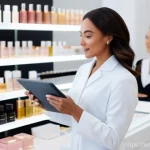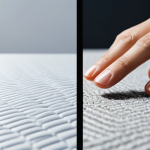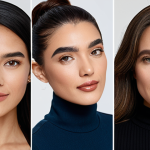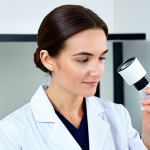Landing your first beauty consultant role right out of school feels like a dream, doesn’t it? I remember feeling that mix of excitement and sheer terror, wondering how to truly stand out when everyone else had passion, too.
The truth is, today’s beauty industry isn’t just about knowing your foundations from your concealers; it’s a dynamic, ever-evolving landscape where understanding personalized experiences, sustainability, and even the nuances of digital engagement – think TikTok trends and virtual try-ons – are absolutely critical.
It’s no longer enough to just recommend products; you need to genuinely connect, solve problems, and envision how you can be a part of a client’s wellness journey, not just their makeup routine.
With the rise of AI-powered skin analysis and the burgeoning demand for truly clean, ethically sourced products, employers are looking for forward-thinkers who are as much tech-savvy as they are empathetically brilliant.
It’s about demonstrating your ability to adapt, to learn, and to truly be a trusted advisor in a world that craves authentic beauty solutions. Let’s dive into the details below!
Landing your first beauty consultant role right out of school feels like a dream, doesn’t it? I remember feeling that mix of excitement and sheer terror, wondering how to truly stand out when everyone else had passion, too.
The truth is, today’s beauty industry isn’t just about knowing your foundations from your concealers; it’s a dynamic, ever-evolving landscape where understanding personalized experiences, sustainability, and even the nuances of digital engagement – think TikTok trends and virtual try-ons – are absolutely critical.
It’s no longer enough to just recommend products; you need to genuinely connect, solve problems, and envision how you can be a part of a client’s wellness journey, not just their makeup routine.
With the rise of AI-powered skin analysis and the burgeoning demand for truly clean, ethically sourced products, employers are looking for forward-thinkers who are as much tech-savvy as they are empathetically brilliant.
It’s about demonstrating your ability to adapt, to learn, and to truly be a trusted advisor in a world that craves authentic beauty solutions. Let’s dive into the details below!
Navigating the Dynamic Digital Landscape of Beauty
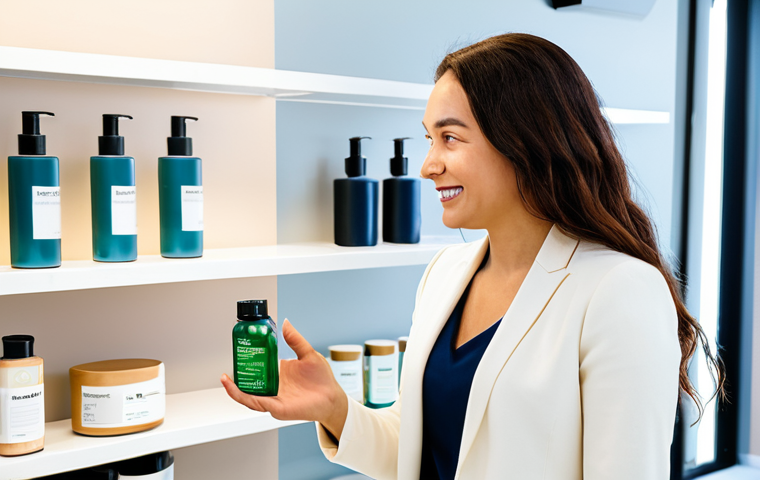
The beauty industry has undergone a seismic shift, and honestly, if you’re not savvy with digital platforms, you’re already playing catch-up. I’ve seen countless brilliant, product-knowledgeable consultants struggle because they couldn’t translate that expertise into the online sphere where so many clients now begin their beauty journey.
It’s not just about having an Instagram account; it’s about understanding the specific nuances of each platform – how TikTok drives trends, how YouTube offers deep-dive tutorials, and how Pinterest shapes aspirational aesthetics.
Your ability to speak the digital language, to understand user generated content, and to even engage with online communities will not only make you a more valuable asset to any employer but also a more effective and relatable consultant to your clients.
Think of it as an extension of the consultation counter, a place where you can share quick tips, debunk myths, and highlight products in a way that feels organic and genuinely helpful, not just transactional.
This digital fluency is no longer a ‘nice-to-have’; it’s as essential as knowing your skin types. It’s about being where your clients are, showing up authentically, and providing value long before they ever step foot in a store or click ‘add to cart’.
Mastering Social Media for Authentic Client Engagement
In today’s beauty world, social media isn’t just for influencers; it’s a vital tool for consultants to build rapport and demonstrate expertise. I remember feeling overwhelmed by it all at first, thinking I needed to be a “content creator,” but it’s simpler than that.
It’s about being present and helpful.
- Showcasing Real-World Applications: Instead of just listing product benefits, share short, engaging videos of products in action. Think quick tutorials on how to achieve a glowy base or the best way to apply a specific serum for maximum absorption. I’ve found clients respond so much better to seeing a product used on real skin, even if it’s just my own!
- Engaging with Questions and Comments: This is where the “consultant” part really shines. Be responsive. If someone asks about a product for oily skin, offer personalized advice, not just a generic link. This builds trust and positions you as an accessible expert, not just someone pushing products.
- Spotting Emerging Trends: Platforms like TikTok are trend incubators. By staying active, you’re not just observing; you’re often getting a first look at what clients will be asking for next week. This foresight allows you to be proactive in your recommendations and demonstrate cutting-edge knowledge.
Leveraging Virtual Try-Ons and AI Skin Analysis Tools
The advent of augmented reality (AR) and artificial intelligence (AI) has revolutionized how clients discover and choose beauty products. Honestly, when virtual try-ons first came out, I was skeptical, thinking nothing beats seeing it on real skin.
But the convenience for the client is undeniable, and the technology has become incredibly sophisticated.
- Enhancing the Consultation Process: Imagine a client unsure about a lipstick shade. Instead of smudging testers, they can instantly see how different shades look on their own face, in real-time, using an app. This speeds up the decision-making process and reduces the fear of making a wrong purchase.
- Personalized Product Recommendations: AI skin analysis tools can identify specific skin concerns—like hydration levels, redness, or fine lines—with remarkable accuracy. This allows you to offer truly bespoke recommendations based on objective data, not just general observations. It feels incredibly professional and scientific, building immense client confidence.
- Bridging the Online-Offline Gap: These tools often start online but can drive clients to stores for further consultation. They provide a deeper, more informed starting point for your in-person interactions, allowing you to dive straight into tailored advice rather than basic diagnostics.
Cultivating Deep, Authentic Client Connections
Beyond the products and the digital wizardry, the heart of beauty consulting still lies in the human connection. I’ve learned that clients aren’t just looking for a new foundation; they’re often seeking confidence, a little pampering, or even solutions to deeply personal concerns about their skin or appearance.
My most rewarding moments as a consultant haven’t been about making the biggest sale, but about truly listening to someone’s story, understanding their unique needs, and then helping them find a solution that genuinely makes them feel better about themselves.
It’s about seeing the person, not just the potential transaction. This requires a level of empathy and intuition that no algorithm can replicate. When you approach each interaction with genuine curiosity and a desire to serve, rather than just sell, you transform a fleeting purchase into a lasting relationship, turning a first-time shopper into a loyal advocate.
This authentic connection is what elevates a good consultant to a truly exceptional one, creating a memorable experience that clients will not only cherish but also share with others.
The Power of Active Listening and Empathetic Dialogue
I cannot stress enough how crucial active listening is in this role. It sounds simple, but truly hearing what a client says – and what they *don’t* say – makes all the difference.
My personal experience has shown me that clients often come in with a vague idea or a surface-level complaint, but by asking open-ended questions and genuinely listening to their responses, you can uncover their deeper needs and desires.
- Going Beyond the Surface: When a client says they want “something for dull skin,” instead of immediately grabbing a brightening serum, I’ll ask, “What does ‘dull’ mean to you? Is it about uneven tone, lack of radiance, or something else entirely?” This shows I’m invested in understanding their unique perception.
- Reading Non-Verbal Cues: Pay attention to body language, tone of voice, and even eye contact. Sometimes a client might say they “love” a product, but their hesitant tone or averted gaze tells a different story. These subtle cues are invaluable for gauging true satisfaction.
- Validating Their Experiences: If a client shares a frustration or a past negative experience with a product, acknowledge their feelings. “I understand how frustrating that can be, especially when you’re looking for real results.” This builds rapport and shows you’re on their side.
Crafting Bespoke Beauty Journeys, Not Just Transactions
The days of one-size-fits-all recommendations are long gone. Today, clients expect a personalized experience that reflects their individual needs, lifestyle, and values.
This is where your expertise truly shines.
- Customizing Routines: Instead of pushing an entire product line, focus on building a routine that fits their budget, time constraints, and specific concerns. I always ask about their current routine and how much time they’re willing to commit; it’s about integrating beauty into their life seamlessly.
- Educating, Not Just Selling: Empower clients with knowledge about ingredients, product application techniques, and how different products work together. When clients understand the “why” behind your recommendations, they feel more invested and confident in their choices.
- Follow-Up and Aftercare: A truly bespoke journey doesn’t end at the cash register. A polite follow-up (if appropriate and welcomed by the client) after a week or two to see how products are working, or offering tips for integration, can solidify the relationship and show you genuinely care about their results.
Embracing Sustainable and Ethically Sourced Beauty
This isn’t just a trend; it’s a fundamental shift in consumer values, and it profoundly impacts how we, as consultants, approach our roles. I’ve personally seen a massive increase in clients asking not just “Does this work?” but also “Where does this come from?” and “Is it good for the planet?” The modern beauty consumer is increasingly aware of the environmental footprint of their purchases and the ethical practices of the brands they support.
If you can confidently speak to a brand’s commitment to sustainability, ethical sourcing, cruelty-free testing, or even their packaging initiatives, you instantly gain a significant edge.
It shows you’re aligned with their values and that you’ve done your homework beyond just product performance. This deeper understanding builds a remarkable level of trust, as clients feel they are making not just a beauty choice, but a responsible and values-driven one.
It’s about recognizing that every product has a story, and being able to tell that story with integrity is key.
Advising on Clean Beauty and Conscious Consumption
The term “clean beauty” can be a bit of a minefield due to a lack of universal definitions, but clients are asking for it, and you need to be able to navigate it with confidence.
It generally refers to products made without certain potentially harmful ingredients and often implies a commitment to ethical production.
- Understanding Ingredient Lists: You don’t need to be a chemist, but understanding common “no-no” ingredients (like parabens, phthalates, certain sulfates) and knowing where to find clean alternatives is crucial. I recommend focusing on what *is* in the product that’s beneficial, rather than solely on what’s absent.
- Guiding Towards Ethical Choices: Clients often care about cruelty-free, vegan, or fair-trade certifications. Being able to highlight brands that genuinely adhere to these standards demonstrates your commitment to their values, not just their skin.
- Minimizing Waste: Talk about refillable packaging, concentrated formulas, and how clients can reduce their beauty waste. Suggesting practical tips like using reusable cotton pads or seeking out brands with recycled packaging resonates deeply with conscious consumers.
Spotting Greenwashing and Building Trust
Unfortunately, with the rise of sustainability, so too has “greenwashing” become prevalent—brands making misleading claims about their environmental practices.
Your role is to be a trusted guide through this maze.
- Learning to Ask the Right Questions: If a brand claims to be “natural,” does that mean 100% natural, or just that it contains some natural ingredients? Are their claims backed by third-party certifications? Developing a critical eye helps protect your clients and your reputation.
- Prioritizing Transparency: Brands that are truly sustainable will be transparent about their supply chain, manufacturing processes, and ingredient sourcing. Look for brands that provide detailed information on their websites and in their communications.
- Educating Clients Gently: Instead of criticizing other brands, empower your clients to be informed consumers themselves. “When I’m looking for a truly sustainable option, I always check for X certification or Y ingredient source transparency.” This helps them make their own informed decisions.
Leveraging Tech Innovations for Superior Consultations
The integration of technology into beauty consultations isn’t just about efficiency; it’s about elevating the entire client experience to a level of precision and personalization that was unimaginable just a decade ago.
I remember when consultations were purely observational – looking at skin under a magnifying lamp and making educated guesses. Now, with the tools available, we can literally see under the skin (metaphorically speaking!) and offer data-driven advice.
This not only makes our recommendations more accurate but also adds a layer of scientific authority to our role. It’s truly exciting to merge the art of beauty with the power of science.
Embracing these innovations means you’re not just selling products; you’re providing a cutting-edge service that sets you apart. Clients are increasingly accustomed to tech-enhanced experiences in every aspect of their lives, and beauty is no exception.
Showcasing your comfort and proficiency with these tools speaks volumes about your forward-thinking approach.
| Aspect | Traditional Beauty Consultant Focus | Modern Beauty Consultant Focus |
|---|---|---|
| Client Assessment | Visual observation, verbal feedback, basic questionnaires | AI skin analysis, diagnostic tools, virtual try-ons |
| Product Recommendation | Product knowledge, brand training, personal experience | Data-driven personalization, ingredient transparency, sustainability info |
| Client Engagement | In-store interactions, phone calls, loyalty cards | Omnichannel presence (social media, virtual consults, in-store), community building |
| Skill Set Emphasis | Sales acumen, product feature knowledge, customer service | Tech literacy, empathetic problem-solving, digital content curation, brand storytelling |
Integrating AI and Diagnostic Tools into Your Workflow
These tools are not here to replace us; they’re here to make us better. I’ve found that using them actually makes my job more engaging and allows me to delve deeper into client needs.
- Objective Data for Personalized Solutions: Tools like AI-powered skin analysis devices can measure hydration, sebum levels, elasticity, and even detect underlying issues not visible to the naked eye. Presenting this data to a client makes your recommendations incredibly compelling because they’re based on concrete information about *their* skin.
- Educating and Empowering Clients: When you show a client their skin analysis results, it’s a powerful educational moment. They can see their progress over time, which reinforces product efficacy and builds long-term loyalty. It moves beyond “trust me” to “let the data show you.”
- Efficiency and Accuracy: These tools streamline the initial assessment, allowing you more time to focus on building rapport and discussing lifestyle factors. This precision also reduces the chances of recommending an unsuitable product, leading to higher client satisfaction.
Crafting Immersive Experiences with Augmented Reality
AR tools, like virtual try-on apps, are incredibly fun for clients and can significantly enhance the discovery phase of their beauty journey. They transform passive browsing into an interactive experience.
- Reducing Purchase Hesitation: How many times has a client hesitated on a bold lipstick or an unusual eyeshadow shade? With AR, they can instantly see it on themselves without commitment. This reduces buyer’s remorse and encourages experimentation.
- Boosting Engagement and Playfulness: Beauty should be enjoyable! AR adds an element of play to the consultation. It’s a fantastic conversation starter and can make the whole process feel more modern and exciting, especially for younger demographics.
- Expanding Product Exploration: Clients might stick to their comfort zone when trying products traditionally. AR encourages them to explore colors, textures, and looks they might never have considered, opening up new sales opportunities and broadening their beauty horizons.
Building Your Personal Brand as a Trusted Expert
In an industry overflowing with products and information, your unique voice and perspective are your most valuable assets. When I first started, I thought being a beauty consultant meant memorizing every product spec.
While that’s important, I quickly learned that what truly makes a difference is building a reputation as someone who is not only knowledgeable but also genuinely trustworthy and relatable.
This means showcasing your unique expertise, whether it’s an affinity for clean skincare, a knack for creative makeup looks, or a deep understanding of mature skin needs.
It’s about letting your authentic self shine through and building connections based on shared passion and genuine advice. People don’t just buy products; they buy into *you* and the confidence you inspire.
Cultivating this personal brand makes you memorable, drawing clients who specifically seek out your style of guidance and trust your recommendations implicitly.
It’s an ongoing journey of learning, sharing, and authentically connecting.
Showcasing Your Unique Perspective and Specializations
Every consultant has a unique “flavor” or area they naturally gravitate towards. Leaning into that passion makes you more authentic and attracts clients who resonate with your specific expertise.
- Developing a Niche: Are you passionate about sustainable beauty? Or perhaps you excel at creating natural, everyday makeup looks? Focus on these strengths. For example, if I’m particularly excited about new sunscreen technologies, I’ll make sure to highlight that interest in my client conversations and informal social media posts.
- Sharing Your Journey: Don’t be afraid to share your own beauty experiences, including challenges you’ve overcome. This vulnerability makes you relatable and shows clients that you’re a real person who understands their struggles. “I struggled with sensitive skin for years, and here’s what truly made a difference for me.”
- Continuous Education and Certification: Show that you’re committed to staying current. Mentioning recent workshops, certifications in specific areas (e.g., advanced skincare techniques, color theory), or even beauty industry conferences you’ve attended, reinforces your dedication and expertise.
The Art of Continuous Learning and Adaptation
The beauty industry never stands still. New ingredients, technologies, and trends emerge constantly. A truly successful consultant is a perpetual student.
- Staying Ahead of Trends: Subscribe to industry journals, follow key beauty editors and scientists, and keep an eye on emerging brands. Being able to discuss the latest buzz, like “skin cycling” or new peptide discoveries, positions you as a forward-thinker.
- Understanding Ingredient Science: While not a chemist, a deeper understanding of active ingredients – what they do, how they work, and what they pair well with – allows you to provide much more sophisticated and effective recommendations than just basic product features.
- Adapting to Client Needs: The demographic and cultural landscape of clients is always evolving. Being open to learning about diverse skin tones, hair textures, and cultural beauty practices ensures you can serve everyone with respect and competence.
Transforming Product Sales into Wellness Journeys
This is where the beauty consultant role transcends simple retail and becomes genuinely impactful. It’s about moving beyond the idea of just selling a moisturizer or a lipstick and instead, helping clients integrate beauty into their broader self-care and wellness routines.
I’ve found that when clients feel understood on a deeper level – when you connect a skincare solution to their desire for more confidence, or a makeup product to their need for self-expression – that’s when truly magical things happen.
It’s about recognizing that beauty is often an entry point to feeling good, inside and out. By adopting this holistic mindset, you’re not just a salesperson; you become a trusted guide on their personal journey toward well-being.
This approach fosters incredible loyalty because you’re addressing not just surface-level needs but underlying desires for health, happiness, and self-assurance.
It requires a shift in perspective, moving from a transaction-focused mindset to a relationship-centric one, where the client’s overall well-being is paramount.
Understanding Lifestyle’s Impact on Skin Health
You can recommend the best products in the world, but if a client’s lifestyle isn’t supporting their skin goals, progress will be limited. This is where a holistic approach comes in.
- Asking About Daily Habits: Gently inquire about sleep patterns, stress levels, hydration, and diet. “How has your sleep been lately? Sometimes that can really show up on our skin.” This shows you care about their overall well-being.
- Connecting Dots, Not Lecturing: If someone struggles with breakouts, you might suggest looking at their diet or stress, not just recommending an acne cream. “Many clients find that managing stress also helps calm their skin. Perhaps adding a meditation routine could complement your skincare.”
- Referring to Other Professionals (When Appropriate): If a client expresses persistent health concerns that are outside your scope, responsibly suggest they consult a dermatologist, nutritionist, or other health professional. This demonstrates professional boundaries and genuine care.
From Routine to Ritual: Elevating the Client Experience
A beauty routine can feel like a chore, but a beauty *ritual* is an act of self-care and enjoyment. Your role is to help clients make that shift.
- Emphasizing Sensory Experience: Talk about the texture of a cream, the delicate scent of an oil, or the relaxing feeling of a facial massage. Encourage clients to slow down and enjoy the application process. “Feel how this balm melts into your skin; it’s like a mini spa moment every night.”
- Promoting Mindfulness: Encourage clients to use their beauty routine as a moment of peace and reflection. Suggest lighting a candle or playing calming music during their evening skincare. It’s about integrating beauty into their self-care narrative.
- Celebrating Small Victories: Acknowledge and celebrate when a client shares positive feedback, even if it’s just feeling more confident. Reinforce that beauty is a journey, and every step, no matter how small, contributes to their overall well-being.
Closing Thoughts
Becoming a beauty consultant today is so much more than just recommending products; it’s about becoming a trusted confidante, a digital guide, and a wellness advocate.
It’s a role that demands constant learning, genuine empathy, and a keen eye for innovation. Remember that initial mix of excitement and terror I mentioned?
That’s still there, but now it’s coupled with the immense satisfaction of truly connecting with clients and making a tangible difference in how they feel about themselves.
Embrace the dynamic shifts, lean into technology, and always, always prioritize the human connection. This isn’t just a job; it’s a journey of empowering others, and it’s truly rewarding.
Useful Information to Know
1. Professional Certifications Matter: While passion is key, formal certifications from reputable beauty academies or brand-specific training programs can significantly boost your credibility and open doors to advanced roles. Look into specialized courses in areas like esthetics, advanced makeup artistry, or ingredient science that resonate with your chosen niche.
2. Network Actively: The beauty industry thrives on connections. Attend industry events, join professional online communities, and connect with peers, brand representatives, and even beauty journalists on platforms like LinkedIn. You never know where your next opportunity or valuable piece of advice will come from.
3. Cultivate Your Digital Presence: Whether it’s a professional Instagram profile showcasing your work and tips, a dedicated blog, or even a well-maintained LinkedIn profile, a strong online presence is crucial. It’s your digital portfolio and a direct way for potential clients and employers to see your expertise in action.
4. Invest in Continuous Education: The landscape of beauty is constantly evolving with new scientific breakthroughs, ingredients, and trends. Regularly read industry publications, subscribe to scientific journals, attend webinars, and participate in workshops. Staying current ensures you remain an authority in your field.
5. Master Client Relationship Management (CRM): For independent consultants or those looking to build a loyal clientele, understanding CRM tools can be invaluable. These help you track client preferences, purchase history, follow-up dates, and personalized notes, allowing you to offer truly bespoke and consistent service.
Key Takeaways
The modern beauty consultant is a multifaceted professional, seamlessly blending traditional human connection with cutting-edge technology. Success hinges on digital fluency, authentic client engagement, a deep understanding of sustainable practices, and the ability to integrate advanced tech tools like AI analysis and AR try-ons into personalized consultations.
Beyond product knowledge, cultivating a strong personal brand built on continuous learning, empathy, and a holistic approach to wellness is paramount.
It’s about elevating every client interaction from a mere transaction to a meaningful, empowering journey towards self-care and confidence.
Frequently Asked Questions (FAQ) 📖
Q: Given the fierce competition and the industry’s rapid evolution, what’s the single most impactful way a new beauty consultant can truly stand out, beyond just knowing product lines?
A: Honestly, what I’ve seen make the biggest difference isn’t just knowing if a client needs a matte or dewy finish. It’s about being a genuine human being who listens.
I remember one client, she came in looking for a new moisturizer, but after really talking to her, asking about her routine, her lifestyle – you know, beyond the surface – I realized her dry skin was more about her lack of consistent hydration and stress.
The product recommendation then became secondary to actually helping her find a routine that fit her life, not just her skin type. It’s that deep, empathetic connection, where you’re not just selling a tube, but solving a problem or enhancing a feeling.
That’s what builds trust and brings them back, every single time. It’s less about the product and more about the personalized solution and the feeling you leave them with.
Q: The text mentions
A: I, digital engagement like TikTok, and the demand for clean products. What specific, practical skills or knowledge areas should aspiring consultants prioritize to meet these evolving demands?
A2: Okay, this is where it gets exciting and a little overwhelming if you’re not prepared! Beyond the basics, you absolutely need to get comfortable with digital tools.
Think about it: can you walk someone through a virtual try-on experience if your store offers it? Can you explain, in plain English, what an AI-powered skin analysis means for their skin, not just show them the results?
And let’s not forget the clean beauty movement; clients are asking about ingredients, sourcing, and sustainability more than ever. You don’t need a chemistry degree, but knowing the difference between “cruelty-free” and “vegan,” or what a “dirty dozen” ingredient list is, will make you invaluable.
It’s less about being a tech wizard and more about being genuinely curious and adaptable. Jump on TikTok, see what people are talking about. Research a few popular clean beauty certifications.
Just be ready to learn and adapt, always.
Q: The concept of “authentic beauty solutions” and being part of a “client’s wellness journey” feels like a big shift. How does a beauty consultant genuinely embody this in their daily interactions?
A: This is probably the most profound shift, and it’s about reframing your entire approach. It’s not about just covering up perceived flaws; it’s about enhancing natural beauty and supporting a client’s overall well-being.
To truly embody this, you need to practice deep, active listening. When someone says they want to look “better,” push a little deeper: what does “better” mean to them?
Is it about feeling more confident in Zoom calls, or is it about managing skin concerns that impact their self-esteem? It’s about being honest if a product isn’t the right fit, even if it’s a best-seller.
Sometimes, the “authentic solution” might even involve suggesting they consult with a dermatologist or focus on hydration and sleep. You become a trusted guide, not just someone pushing products.
It’s truly about nurturing a relationship where their well-being, both inside and out, is your primary focus.
📚 References
Wikipedia Encyclopedia
구글 검색 결과
구글 검색 결과
구글 검색 결과
구글 검색 결과
구글 검색 결과

